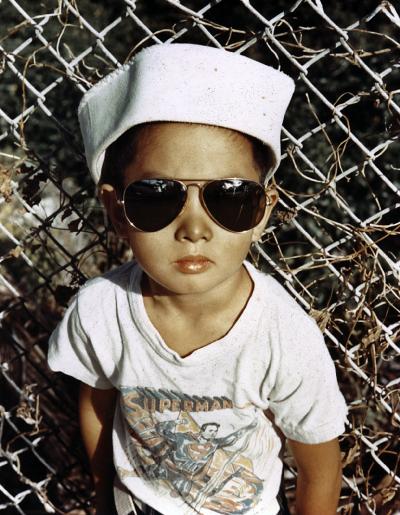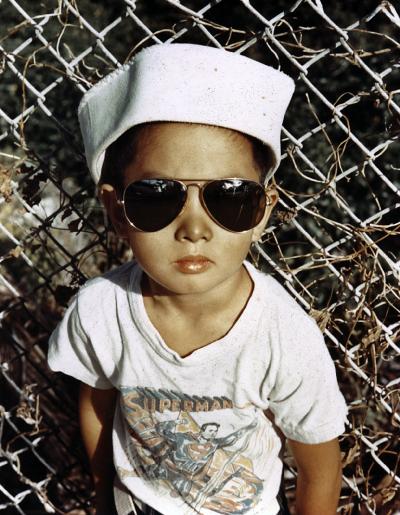March 13, 2003
English professor becomes accidental TV star
This is the story of how Professor of English Shawn Wong became a television star. Or at least, a notable on PBS.
About two years ago he was contacted by the producers of a planned PBS documentary on Chinese Americans. “They asked what they should read, who they should see. So I talked to them,” says Wong, who had been involved with several documentaries on this subject over the years.
But that wasn’t the end of it.
Nine months later the producers returned, asking Wong, “Now, what should we do?”
“I gave them the names of historians. I suggested they attend an upcoming Asian American Studies convention and try to find those historians who could talk intelligently and not put viewers to sleep,” Wong says.
Wong thought his work was done.
But the producers called a third time, a few months later. They had read all the suggested books and followed all of Wong’s excellent leads — but now they wanted him to appear in the documentary. Wong resisted.
“I’m not an historian,” he told them. “I haven’t taught Chinese American history for 10 years. I’m out of the loop on what people are thinking and writing about now.”
“We think you should be in it,” they told him.
“But I don’t like seeing myself on television,” he replied. “And there have been so many documentaries about Chinese Americans. How will yours be different?”
“Everyone will see this,” they said, “because it’s hosted by Bill Moyers.”
Still skeptical, Wong asked them, “How many PBS stations will air the documentary?”
“All of them.”
Wong began to waver, but he had one final question. “Will it be fun?”
“Yes,” they promised, “it will be fun.”
So, Wong became the first contact for the producers, two years ago, as well as the final interview. And to his surprise, it was fun.
“I had a good time on camera and doing the research,” he says. “I’ve never met producers who were so thorough. They did an amazing amount of research. And I think this documentary will have a different perspective.”
Becoming American is a three-part documentary. The first two parts trace the history of Chinese in America, from the Gold Rush through World War II. The third part deals with contemporary issues and consists primarily of personal vignettes. Wong is the only person who appears in all three segments.
“Although the focus of the documentary is on Chinese Americans, the programs shed light on the idea of what it means to be an American,” Wong says.
The two events around which Becoming American is built are the Chinese Exclusion Act of 1882 — the first time the United States banned any group based on race or nationality and the Immigration Reform Act of 1965 — which removed the most severe bans on immigration by Asians and other non-Europeans.
“Chinese were the only group that was legally discriminated against by an act of Congress,” Wong says. “Even after the so-called repeal of the Exclusion Act, the government quota was 105 individuals per year, by country of ancestry — so that a Chinese person from Malaysia counted against the total in the same way as someone from China. It wasn’t until 1965 that the quota was raised to 20,000 per country.”
Wong’s parents immigrated to the U.S. in 1947, and he was born and raised in Oakland, Calif. “My parents told me that I was Chinese American and that I was different from them.”
And it was clear from the way he was raised that he was culturally different: A picture of a 7-year-old Shawn Wong, complete with cowboy hat, guns, and chaps, is featured on the Becoming American website, http://www.becomingamerican.org/.
Still, the adoption of standard elements of American culture did not spare Wong from embarrassing incidents.
“When I was in second grade my dad, who was an engineer for the Navy, moved the family to Taiwan,” he says. “I was enrolled in the American Navy school. On the first day of class, I climbed on the school bus and my mom was with me. When we got on the bus, the other kids began chanting, ‘No Chinese allowed on the bus.’ But we sat down anyhow.”
The story has a good ending: “A blond girl about my age came over to my mother and asked, ‘Can I sit next to your son?’ She sat down next to me and held my hand. She became my best friend in second grade and was the first girl I kissed, in class. We were inseparable. We must been an odd-looking pair.”
Wong has seen only short pieces from Becoming American and is looking forward to its debut. “The whole experience working on it was fascinating,” he says.
Becoming American: The Chinese Experience premieres at 9 p.m. March 25, 26 and 27 on KCTS.




